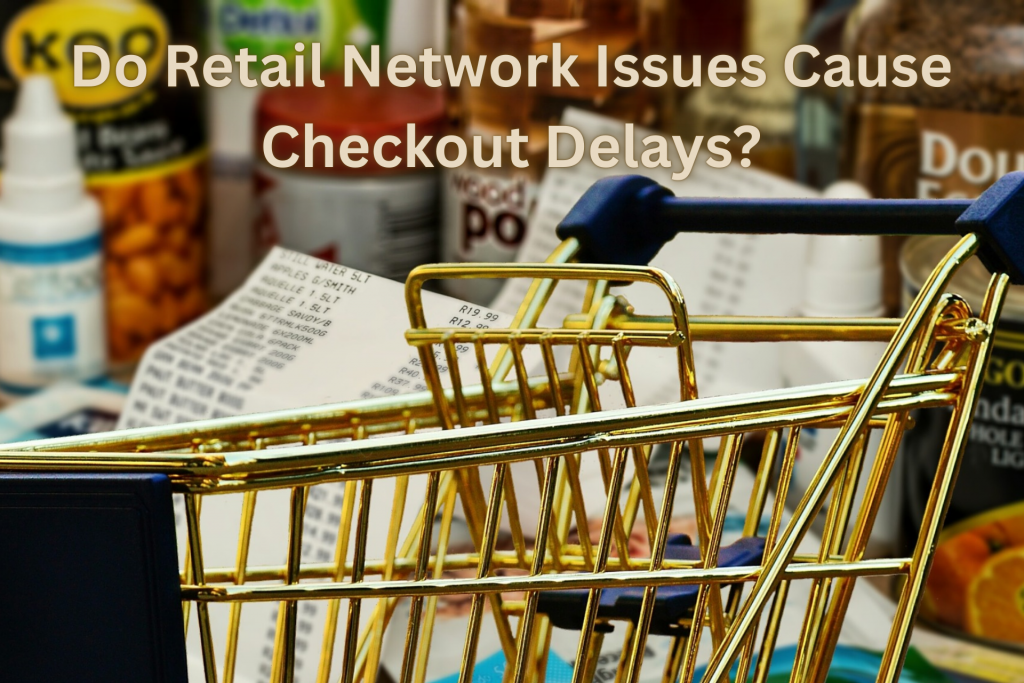In the retail industry, every second at the counter matters. This is because many customers get bored and frustrated by the long queues. When this happens, chances are they will just leave and find somewhere else to buy their stuff from. Hence, leading to loss of sales and bad store reputation. Although most retailers would put the blame on having staff shortage or having old hardware, the real culprit could simply be network performance. So, retailer business owners must consider asking the question-Are poor networks causing retail checkout delays? Because, surprisingly, the answer is-Yes!

Are poor networks causing retail checkout delays
Are Poor Networks Causing Retail Checkout Delays?
You might have already encountered how frustrating an unstable or lagging network can be when browsing the internet. A network lag, retail industry, is even worse as it slows point of sale (POS) systems directly. When this happens, POS connectivity goes dead and results in held transactions. Moreover, this starts a domino effect wherein customers in the queue might give up their purchases as employees struggle and fight to reboot terminals. This technical glitch, albeit momentarily, results in loss of revenue, employee demotivation, and marred store reputation.
The Impact on Customer Experience
Retailers have now come to accept that the modern buyer wants something quick, easy, and efficient. Therefore, waiting in long queues at checkout is a big no-no. This is because once customers experience delays, they may be willing to go back, but recurring problems because of network lag, retail stores, push them towards competitors. Therefore, store owners should consider the question: Are poor networks causing retail checkout delays? Because it definitely can, as network reliability, is equal to customer loyalty in retail in this new and very technical world.
How POS Connectivity Shapes Operations
Retail depends on point-of-sale systems, also called POS. This is because modes of payment other than cash need either a swipe, tap, or scan and they all rely on strong and stable connectivity. Even with a few seconds of network lag, retail stores will suffer from accumulated failed transactions per day. If you consider spreading this across multiple locations, the impact worsens exponentially.
Retail Wi-Fi Analytics and In-Store Performance
Retail in this day and age needs more than a functional Wi-Fi. They need retail Wi-Fi analytics that enable managers to learn about how the network is used, how customers act, and what devices are popular. Additionally, in-store analytics will also help retail management identify blind spots, allocate bandwidth, and prevent network bottlenecks so that these issues don’t affect customers.
Network Lag: The Silent Revenue Killer
Are poor networks causing retail checkout delays? Yes, it does as networks that are slow fail transactions that could have added to the store’s income. These unsuccessful payments also increase the possibility of duplicate charges that frustrates customers. This also adds burden to your staff as they are the ones to face angry customers and issue refunds. Moreover, your team members may need to redo their tasks or fix mistakes from the glitch which further slows down the lines. This ripple effect implies that what begins as a few seconds will turn into hours of wasted productive force and income.
The Role of In-Store Analytics
Retail Wi‑Fi analytics and In-store analytics are essential to retail stores. They go beyond sales data. In-store analytics reveal the number of devices connected to the network, when the system is working at its peak, and where their connection weaknesses are. Through these pieces of information, retail store management would be able to reinforce staff or infrastructure to aid in facilitating transactions effectively even during the rush hours.
Establishing a Trustworthy Retail Network
Retailers require networks with scale and performance. This includes additional links to prevent one-point failures and automated monitoring to identify issues before creating downtime. Moreover, cloud-managed Wi-Fi to manage and control easily across locations are also essential. To add to this, prioritization of POS systems over guest Wi-Fi is also necessary. By focusing on such factors, retailers avoid the bottlenecks that slow down sales.
Real-World Example of Checkout Delays
Think of a store on a holiday weekend. You just know immediately how busy it can get and when the POS system crashes mid-morning because of low connectivity, it can spell instantaneous disaster. A queue of ten customers becomes impatient then angry and just storms off without buying anything. Others, while they may seem calmer, may have already been ranting on social media. Expectedly, sales are lost in real time and long-term trust is destroyed.
How Managed IT Services Help Retail
Not all retailers have a huge IT department. That is where managed IT services such as EB Solution network retail solutions come in. As retailers partner with EB Solution, they also acquire 24/7 monitoring, proactive determination of issues, and professional assistance that is always reachable. This managed network support also helps in preventing internal personnel from getting overwhelmed by these technical issues. Furthermore, these services are delivered by companies offering cybersecurity and managed IT services, so that the operations of the retail company remain online, secure, and user-friendly.
EB Solution and Retail IT Support
EB Solution offers customized network solutions to retailers in the U.S. These services range from securing POS systems to enabling in-store analytics. Additionally, their services reduce network lag and eliminate costly downtime. Hence making them reliable partners for managers who want to achieve smooth checkouts and customer satisfaction.
Step into the Future of Your Retail Business
Retail is now transforming towards digital customer-first experiences. With this, networks are the basis of mobile checkouts and contactless payments. However, these innovations cannot be applied without a healthy infrastructure. Therefore, good connectivity is now vital in creating a positive customer experience and improving loyalty retention. So, as retail business asks, are poor networks causing retail checkout delays? Yes, it does but it can be made strong and stable.
